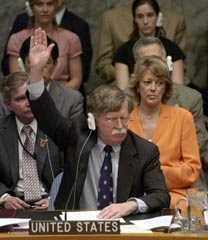
US Ambassador to the UN John Bolton (front C)
vetoes a resolution before the UN Security Council condemning Israel for
incursions in the Gaza Strip, at the United Nations in New York July 13,
2006. Ten of the 15 member nations voted in support of the resolution,
four abstained and the US vetoed. [Reuters] |
The
United States blocked an Arab-backed resolution Thursday that would have
demanded Israel halt its military offensive in the Gaza Strip, in the first UN
Security Council veto in nearly two years. (Click to see Middle East Conflict Full Coverage
)
The draft, sponsored by Qatar on behalf of other Arab nations, accused Israel
of a "disproportionate use of force" that endangered Palestinian civilians, and
demanded Israel withdraw its troops from Gaza.
The United States was alone in voting against the resolution. Ten of the 15
Security Council nations voted in favor, while Britain, Denmark, Peru and
Slovakia abstained.
The US has periodically used its veto to block resolutions critical of
Israel. The last council veto, in October 2004, was cast when the United States
blocked a resolution condemning another Israeli operation in Gaza.
The draft was reworked repeatedly to address concerns that it was too biased
against Israel. Language was added calling for the release of an abducted
soldier and urging the Palestinians to stop firing rockets at Israel.
Nonetheless, US Ambassador John Bolton said it was still unacceptable because
it had been overtaken by events in the region, including the capture of two
Israeli soldiers by Hezbollah militants on Wednesday, and was "unbalanced."
"It placed demands on one side in the Middle East conflict but not the
other," Bolton said. "This draft resolution would have exacerbated tensions in
the region."
Israel launched the operation two weeks ago in response to the June 25
capture of an Israeli soldier, 19-year-old Cpl. Gilad Shalit.
The resolution called on Israel and the Palestinians to "take immediate steps
to create the necessary condition for the resumption of negotiation and
restarting the peace process." It urged all parties to help alleviate the "dire
humanitarian situation" faced by Palestinians.
The United States sought a text that said the Israeli actions were in direct
response to rocket attacks against Israel and Shalit's capture.
Bolton said the United States remains "gravely concerned" at the escalation
of the conflict and believes the best way to calm the situation is for Hamas to
release Shalit.
The draft also demanded Israel release the Palestinian officials it has
arrested.
The Palestinian observer to the UN, Riyad Mansour, said he was disappointed
with the council's "continued inability to act while innocent Palestinian
civilians continue to be brutally killed by the Israeli occupying forces."
Referring to past US practice of vetoing similar resolutions, Mansour said
the council is failing the Palestinians. In Gaza, the Palestinian Foreign
Ministry spokesman, Taher al-Nunu, said the United States must bear some
responsibility for Israel's attacks.
"The veto is a political cover for the crimes of the occupation, and
regrettably, instead of putting war criminals of this government that lost its
mind on trial, they are giving a political cover to carry out more of these
crimes," al-Nunu said.
In a speech to the council immediately following Mansour, Israel's UN
Ambassador Dan Gillerman thanked the US for its "bold stand." He defended
Israel's actions and put the blame for attacks against Israel squarely on Iran
and Syria.
"What we are seeing are the actions of Hamas and Hezbollah, but they are
merely the fingers of the bloodstained hands and the executioners of the twisted
minds of the leaders of the world's most ominous axis of terror, Syria and
Iran," he said.
Eight of the last nine vetoes in the council have been cast by the United
States. Of those, seven concerned the Israel-Palestinian
conflict.